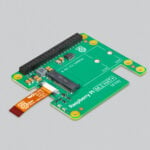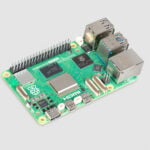1TB Raspberry Pi SSD on sale now for $70
How much data can a terabyte store? TL;DR: Loads. For example, you can save a quarter of a million photos, 200,000 songs (my first MP3 player held just 40… it got awfully repetitive), 250 HD movies, or 20–30 AAA games.
To facilitate your consumption of the aforementioned media, we decided you should have the option to purchase a 1TB capacity SSD from us.

A Raspberry Pi SSD unlocks outstanding performance for I/O intensive applications on Raspberry Pi 5 and other devices, including super-fast startup when booting from SSD. It is a reliable, responsive, and high-performance PCIe Gen 3-compliant SSD capable of fast data transfer, and is available in 256GB, 512GB, or 1TB capacities.
You’ll need a Raspberry Pi 5–compatible M.2 adapter, such as the Raspberry Pi M.2 HAT+, to use our SSDs.
Other fun peripherals
While we’re here, we thought it might be a fun idea to remind you of some of the other peripherals we manufactured for your pleasure.
Raspberry Pi Bumper
For a minimalistic yet effective layer of protection, the flexible silicone Raspberry Pi Bumper snaps onto the bottom and edges of your Raspberry Pi 5. We magicked this product up after our engineers kept trying to make their own versions of a half-case, so they could fiddle with their Raspberry Pi boards while keeping them safe from their desks at the same time.

It costs a whole $3 and might be just the solution you’re looking for.
Raspberry Pi SD Cards
As well as SSDs, we also offer our official microSD cards. They are available in 32GB, 64GB, 128GB, and 256GB capacities, and come optionally pre-loaded with Raspberry Pi OS. Any one of these will optimise data transfer speeds on your Raspberry Pi computer and help ensure you get the smoothest user experience from your device.

Raspberry Pi Active Cooler
If you’re putting your Raspberry Pi 5 through its paces, you might want to chill it out with a Raspberry Pi Active Cooler. It’s a dedicated clip-on cooling solution for Raspberry Pi 5, combining an aluminium heatsink with a temperature-controlled blower fan to keep your Raspberry Pi 5 at a comfortable operating temperature, even under heavy loads.

Your turn
What’s your favourite lesser-known Raspberry Pi product? Let us know in the comments. It doesn’t have to be an official one — we love seeing all the weird and wonderful things our Approved Resellers think up.





35 comments
Jump to the comment form
Helen McCall
I kept hoping you would make a 1TB M2 SSD available. And now at last you have. Thank you.
Jack
We’ve come a long way from the full height 5.25 128M hard drives of old :-)
AndyD
The XT clone that I purchased in 1990 had a full height 5.25″ hard drive with a capacity of 20M. I actually wondered if I would ever fill it.
W. H. Heydt
The original HDDs in IBM PCs were 5MB.
A.E. Rich
Yep, then about a year later we installed 10Mbyte HDs (!), and that storage was huge. What do the kids of today know??
Milliways
When l designed a floppy controller for my first computer in 1976 I had heard of hard disks but wondered why you would ever need more than 1.2MB.
Roger
My first hard drive was a 10MB 8″ Winchester for an Intel development system at work. That was back in the 80’s.
Mark Tomlin
Wait. You guys make a 256GB SD Card now?
W. H. Heydt
That’s what they say. They were seen in the wild a few weeks ago, but now it’s official. However, none of my usual sources seem to have them, and ordering outside the US (for someone within it) is kind of dicey at the moment.
Anders
“make” is not the right word.
David Fowler
Great news on the 1TB NVMe SSD card. :)
As for my “favourite lesser-known [unofficial] Raspberry Pi product,” it would be the GeeekPi M.2 board that attaches to the underside of the Raspberry Pi, leaving the GPIO pins and space above the rPi available for whatever HAT I may want to attach.
Also, I notice the images of the Pi 5s in the article show connector sockets in the location for the auxiliary power switch take-off. All the Pi 5s I’ve seen have only a blank pad to which I’ve had to solder my own sockets. Do Pi 5s now come with pre-attached sockets?
Gordon77
Are you confusing it with the rtc battery socket ?
David Fowler
No, I was confusing it with the UART socket. I simply forgot which connector and pad was which. :)
I see that the spot for the auxiliary power button pad (J2, which is adjacent to the RTC battery connector) is still unpopulated in the photos.
Delta
This is a fantastic upgrade — a 1TB official Raspberry Pi SSD at just $70 is a game-changer for anyone running storage-heavy projects on the Pi 5. Love that it’s NVMe and fully supported out of the box.
I’m curious about the real-world performance compared to the 512GB version. Any chance we’ll see official benchmarks soon?
Also, will there be bundles with the M.2 HAT+ and SSD together? That would make the upgrade process even smoother for newer users.
Thanks for continuing to push the platform forward — can’t wait to try this out on my next build!
James
Will this work on a Raspberry PI 4 with an adapter?
CreatedWithATrackPoint
Yes, it will work with a usb m.2 adapter
Zork
No RPi 4 support earns this a solid “Meh.”
Helen McCall
Dear Zork, The Pi4 does not have the NVME channel. However if you really want to use an nvme ssd on the Pi4, this can be done easily using one of the usb adapters available from many suppliers. However it would be worth changing to using the Pi5 because it has many significant improvements over the Pi4.
Lolo22
So now, Raspberry Pi is officially in solid state disk business 😆
CreatedWithATrackPoint
they already were in the business for months
Lolo22
Since they have peripherals for its modular SoC, I hope they keep the standard of io interface consistent (for a couple of generations long enough to be useful and future proof)!
CooliPi
Is it SLC, MLC, TLC, QLC or pSLC? Or any other multiple bits encoding scheme?
Mark Tomlin
Why is TME — a reseller that you list on your site — selling this reported $70 USD drive for $96 USD? What’s with the 35% markup?
https://www.tme.com/us/en-us/details/sc1984/raspberry-pi-acessories/raspberry-pi/raspberry-pi-ssd-1tb/
Raspberry Pi Staff Ashley Whittaker — post author
Might be to do with the new tariffs. I’ll check.
Helen McCall
Hi Ashley,
Remember to check not just the tariffs, but also the usual extortionate “processing charges” for the carrier company to do the paying of the tariffs. Many carriers charge a sizeable percentage of the total payment of tariffs/customs/tax. So the higher the amount of the tariff, the greater the profits for the carrier.
Mark Tomlin
Ah, it went up by 25 cents. Now $96.25 USD. Any news on to the reason why?
Jack
Any chance of getting this installed on te 500?
mark
great to see this, thank you for offering this!
what is the TBW endurance rating for the SSD? would it be suitable for use in continually recording videos?
David Black
Thanks Ashley, looking forward to performance comparisons.
Is it worth adding?…
To use our SSDs, for Raspberry Pi 5 you’ll need a compatible M.2 adapter, such as the Raspberry Pi M.2 HAT+. Also compatible with CM5 while using the Compute Module 5 IO Board.
Kindest regards
Blaz
How about making a 500 (or 5= with an actual M.2 slot this thing would fit into? No adapters pretty please.
Eric
The big question is, “how much space” does the smallest file take up on a one Terabyte drive, and should you partition it to reduce wasted space, For example on my system a file that only uses a byte of data would take up 4096 bytes of space. So therefore it might be a wise choice instead of having a hundred little files, put them together in one big file, with a index at the top to jump down to the contents you took from a small file.
______________________________________________________
But on a more productive note:
I have a back up USB hard-drive called “My Passbook” I used to back up my laptops, you can hear the motor spin up after you plug it into a USB port, I think a USB SSD equivalent might be a good option, in fact I might start asking around next week.
Helen McCall
Dear Eric,
You might want to read through the documentation for the partition tool parted/gparted and learn the way to adjust the block size on partitioning before putting the filing system on the ssd. If you know the average size of the files you want to store, and have also read the technical documentation for the ssd, you should be able to choose a suitable block size to use to maximise the available space. The important thing is to read all this documentation carefully so that you fully understand what you are doing. If you are adjusting the block size for maximum space utilisation, you can expect to lose some speed on reading and writing. It is all a balancing act to determine an optimum figure for the block size.
Eric
Silly me, I am doing things backwards, there is a USB SSB back up
John009
I’ve been playing Minecraft Java on mobile with PojavLauncher for a while, but seeing a 1TB SSD for Raspberry Pi makes me think it’s time to move the experience over to PC. That kind of storage opens up way more possibilities.
SIMPLIFY
i need this 🤩